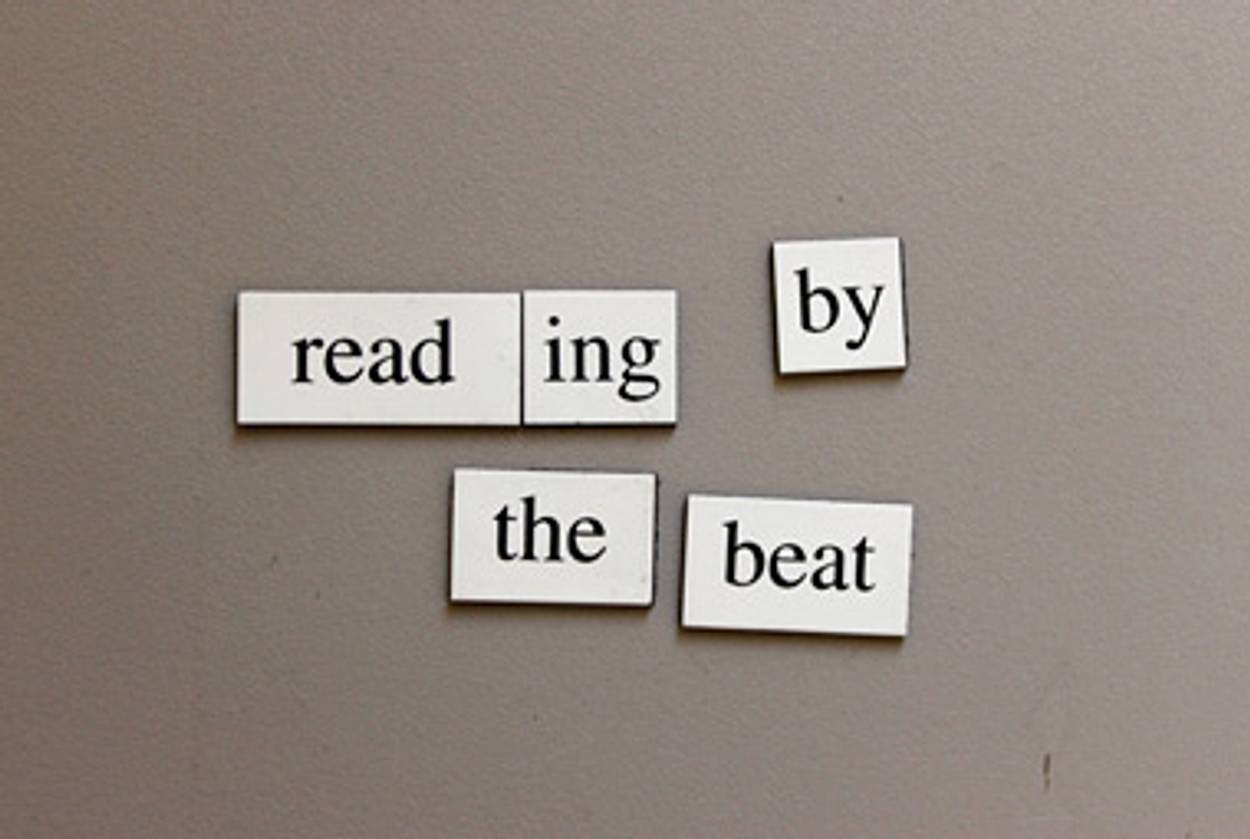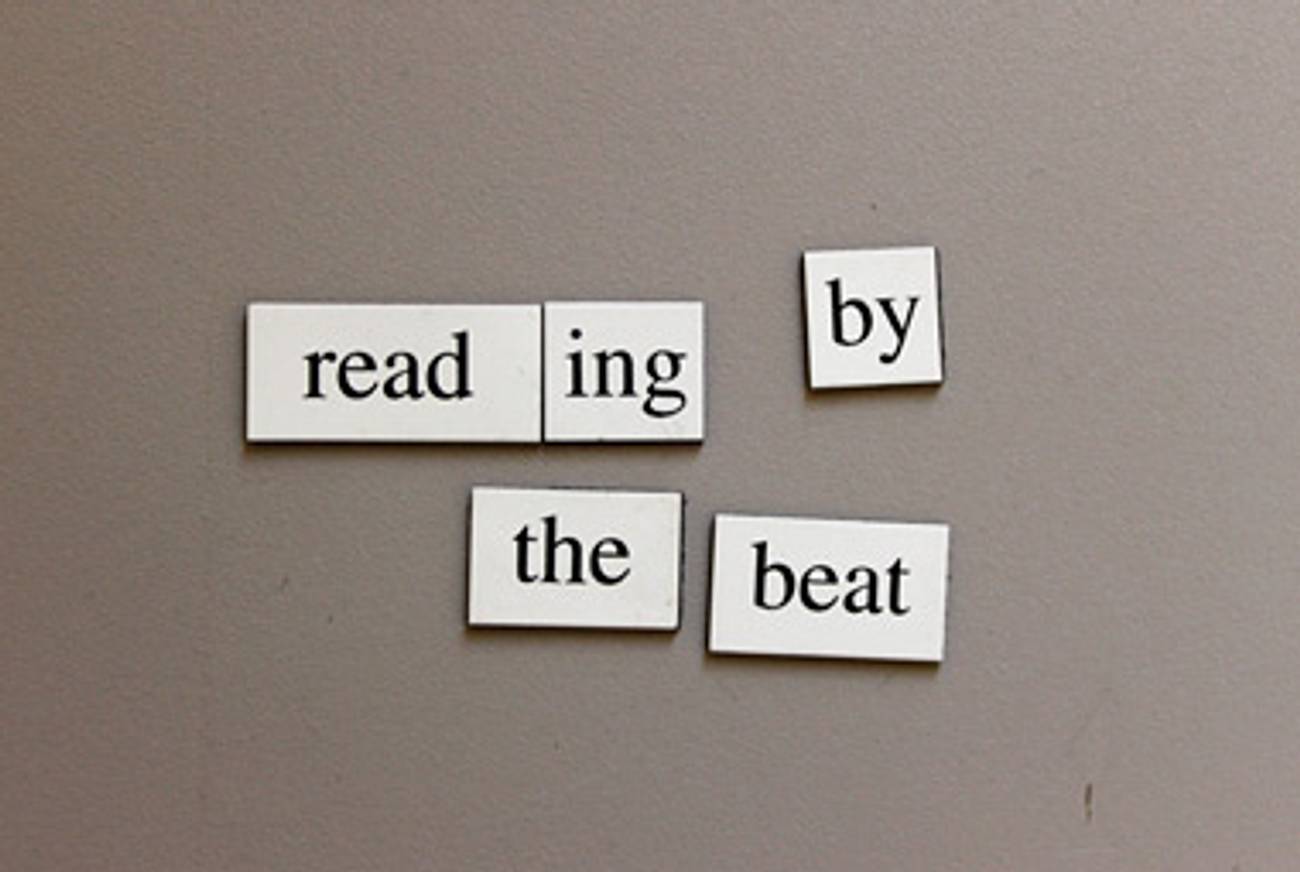Enthusiastic Blasphemy
Poets Daniel Morris and Stephen Paul Miller, coauthors of the anthology Radical Poetics and Secular Jewish Culture, explore the possibilities and contradictions of secular Jewishness




The future ages quickly, so it’s hardly news that every generation produces its own avant-gardes and its own ways of rethinking religion. Daniel Morris and Stephen Paul Miller, who together edited the 2009 anthology Radical Poetics and Secular Jewish Culture, are interesting experimental poets for any number of reasons, but they are most striking for the sheer Jewishness of their secularism and therefore for the sheer secularity of their Yiddishkeit.
In the most notable of the poems in his new book, If Not For the Courage, Morris imagines himself watching an old video of what he thinks is the band Blondie. But the lead singer is somehow wrong:
NOT
Debbie Harry, but my aunt, Diane
Simon, 78, currently of Pembroke
Pines, Florida, formerly Plainview,
Long Island.
And it’s not only Aunt Diane. The band actually consists of the older generation of his extended family. Everyone’s up there except for “Uncle Arnie, 80, who shoots his/ age, and Rina, who married into/ a dynasty of dental prostheticians and/ and owns a beach home in Marblehead.”
For all the humor of the family lore, the lower-middle class striving (dental prostheticians! and a dynasty, no less!) and the idioms of a bygone time, there is an edge to Morris’ joke. You can hear it in the phrase “currently of Pembroke,” an expression you only catch in wedding announcements and, more pointedly, in obituaries.
In the bizarre juxtaposition of his relatives and Blondie, Morris both presents his pedigree (suburban Jew and quondam punker) and contemplates his death. He conjures up a double, a “caller from Kentucky,” who, at 40, is well past the glory days of the New Wave clubs of the late ’70s: “flabby, bald, and given the state of punk, / wishing for a lobotomy from Joey, who is like Johnny and Dee Dee/ and Big Daddy Ernie, really gone.” It is just a little horrifying to realize that Joey, Dee Dee, and Johnny—founders of the Ramones, the band that brought us wonderfully dumb suburban punk classics like “Teenage Lobotomy”—are all dead, or, in a hipster lingo long since passed, gone, baby, gone. Big Daddy Ernie sounds like an old blues shouter or a late night deejay. He was, in fact, Ernie Morris, the poet’s father, who died more than 30 years ago at the age of 45.
The Ramones, Big Ernie, and Aunt Diane constitute Morris’ intermediate past, that odd period that seems like just yesterday and isn’t. Joey Ramone (born Jeffry Ross Hyman) died 10 years ago this April. Dan Morris is no longer 17. He is, in fact, 48 and has three small kids. His students are now hipper if not than thou, at least than him. By his own account, Morris, who once lived in a pop-culture future present, now survives as a middle-class, middle-aged revenant. Not that he mourns much. Morris is too happy a dad and too self-deprecating a poet for that. He is just surprised that this thing—call it age or call it history—has happened to him.
Morris’ sense of history is not sacred in any sense. Nothing particularly religious there. He tells a witty parable of a hung-over vegan—a hipster like himself and yet not himself—who “self-mockingly sniffs the hops” of the last beer in the fridge as if it’s an etrog and finds, in that ambiguous gesture, his own small measure of salvation. When he discusses the Holocaust, Morris talks somewhat provocatively about the “[l]eavings/ of the usual guilt for a porky Jewish Yid who happens to love brats in steam/ beer.” He makes it clear that the Shoah is a real presence for him but mostly as a “usual” guilt that attends it (usual for my generation, at least) and as mere representations of the original horror.
Stephen Paul Miller, Morris’ co-editor, is not all that different, although he is at times less gentle and a good deal edgier. In the riffs of his athletically speedy poem-essays, he is happy to take the history of Judaism head-on as in “There Is Only One God and You Are Not It,” which will be published in a new collection to appear this year:
There’s only
one god.
Stick with Yahweh. Enjoy
His touching if psychotic collective cognitive
shift of
ground from which we think—
power and reality rumble in subtle, pre-Platonic spheres.
Yahweh
sanctions sweet
proto-ideological me
and I’ve already spent nine
minutes
on identity with three
for music ’n poetry.
This last crack shows that his enthusiastically blasphemous take on the Almighty was originally part of a performance. Miller associates poetry with oral presentation and intellectual provocation, with standing there in front of an audience and riffing in high terms and low talk. Poetry is about communication and community, something you do in public.
So, voice is very important for Miller. It is for Morris as well, who is a dab hand at mimicry, imitating a language he associates with his long-dead father (“bupkis/ Crapola, daddy can’t rub two nickels, stuck somewhere between shit/ and shinola”) or one he associates with his students: “while you pretend to be this rad/ instructor …/ hiding out here as/ resident wild hair genius at Purdue in Northwest fucking Indiana cornfields.” And it’s somewhere in voice that Miller and Morris’ most interestingly secular Jewishness can be found.
Miller and Morris are secular in the most radical sense. They live in a human, historical time that is not made whole by redemption. They talk about their kids—a lot—and their daily lives not because those lives are somehow exemplary. Nor do they believe that the shards of earthly existence can be transfigured by acts of tikkun. They are just (just!) doting Jewish fathers, guys who eat brats and corn flakes (but not at the same time). They listen to the Ramones and Blondie. They don’t claim to be glamorous. They are academic shlubs.
They’re also wiseasses. Avantgardistas mean to unsettle and when possible to surprise. (The old motto, épater la bourgeoisie means nothing more than to amaze the stuffy middle classes.) That is the signature of their novelty. In this way experimental artists bear a certain affinity with Jewish comedy. Think Lenny Bruce or Sarah Silverman. Think that seminal influence, MAD Magazine, whose furshlugginer humor originally crossbred a Yiddish zeal for deflation with a sly and markedly adolescent contempt for authority.
One of the particular novelties that poets like Morris and Miller as well Charles Bernstein, Bob Perelman, and others have brought to contemporary American poetry is a mix of slapstick, abstract thought and verbal experimentation. The arguments splay. The sentences fracture. The syntax veers, and the language becomes rich and strange. All the while, they’re working on their timing and cracking jokes. Theirs is a male Jewish nerd’s revenge on the establishment.
These guys don’t speak Yiddish, to be sure, but they remember some of its inflections. In this, their poetry is of their generation. Anyone not brought up on MAD or classic movies like Blazing Saddles orthe Bergmann take-off De Düva, or old recordings of Lenny Bruce and the 2000 Year Old Man, would not be able to reproduce its particular tone. But they won’t need to. Being of their time, they will tire of our own future past and produce a new experimentalism. And a Jewish secularism of their own.
David Kaufmann teaches literature at George Mason University.
David Kaufmann teaches literature at George Mason University.